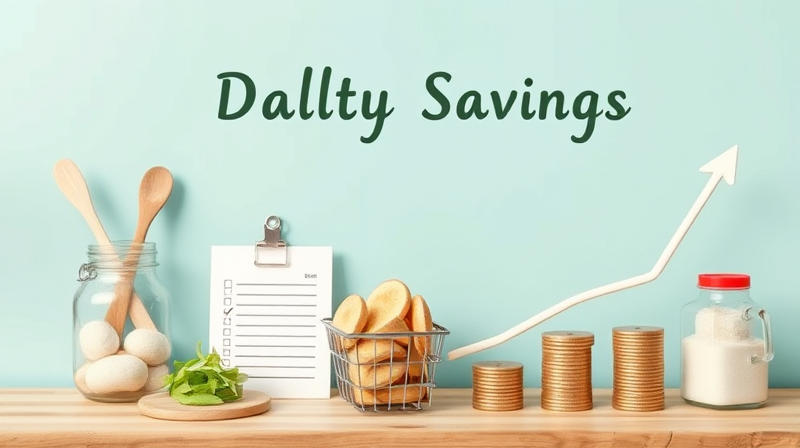Living in today’s fast-paced world can often feel like a juggling act between maintaining a quality lifestyle and managing rising costs. However, by making small yet impactful changes in our daily habits, it is possible to ease the financial strain and create a more stable environment for yourself and your family.
The journey to financial wellbeing doesn’t always require drastic measures. Instead, it is about embracing simple strategies that make everyday activities more cost-efficient. Whether it’s rethinking how you shop or adjusting your household routines, each small step can lead to big savings over time.
Smart Grocery Shopping
One of the most significant areas where many of us unknowingly overspend is on groceries. A well-planned trip to the supermarket not only saves money but also reduces waste.
- Buy in Bulk: Purchasing items like rice, pasta, and frozen vegetables in larger quantities often reduces the cost per unit and minimizes the number of trips to the store.
- Choose Generic Brands: Many generic brands offer quality products at a fraction of the price of leading brands. Embracing these alternatives can make a big difference in your monthly budget.
- Meal Planning: Organizing your meals for the week allows you to avoid the costly habit of impulsive takeout orders. It also helps in utilizing ingredients fully and reducing food waste.
By planning ahead and making informed choices, you not only save money but also contribute to a more sustainable lifestyle.
Cooking More, Dine Out Less
Another potent strategy is to prioritize homemade meals over dining out. When you cook at home, you gain control over ingredients and portion sizes, which can improve your overall health and your budget.
Batch cooking and one-pot meals are excellent ways to simplify the cooking process. These methods are not only convenient but also save time, making it easier to stick with the habit of cooking at home.
Even if you decide to treat yourself with a meal out, consider taking advantage of discounts and special offers and opt for water instead of more expensive beverages. Such small adjustments cumulatively contribute to considerable savings over time.
Cutting Costs on Subscriptions
The modern world offers an array of subscription services, from streaming and fitness to specialized apps. However, not every service is essential, and many people pay for subscriptions they rarely use.
A periodic review of your subscriptions can reveal opportunities for reducing recurring expenses. Canceling redundant subscriptions or sharing costs among family and friends can relieve a substantial financial burden.
Streamlining your subscriptions allows you to free up funds for other necessary expenses or even build a buffer for savings in the future.
Enhancing Energy Efficiency at Home
Household energy consumption is another area ripe for optimization. Simple adjustments, such as tweaking your thermostat during extreme weather conditions, can lead to significant reductions in utility bills.
Switching to energy-efficient LED bulbs, unplugging devices when not in use, and embracing natural light during the day are minor changes that have a big impact on your monthly expenses.
These practices not only lower costs but also contribute to a greener, more sustainable mode of living, benefitting both your wallet and the environment.
Innovative Shopping Strategies
Everyday shopping, when done mindfully, can prevent unnecessary overspending. Sticking to a prepared list helps avoid impulse purchases, ensuring you only buy what is necessary.
- Cashback and Rewards Programs: Utilizing technology to earn cashback or rewards on your purchases can add up to substantial savings over time.
- Secondhand Purchases: From clothing to electronics, buying secondhand can provide quality items at a fraction of the cost of new ones. This strategy is also an environmentally friendly way to reduce waste.
These practices encourage a mindful approach to spending, ensuring that every purchase is an investment in your future.
Adopting a Thrifty Mindset
It often pays to be relentless about small, everyday expenses that might otherwise be overlooked. Simple choices such as brewing your own coffee rather than buying a cup at a coffee shop can result in considerable savings over time.
Moreover, embracing DIY repairs for small fixes on clothes, furniture, or electronics means you’re extending the lifespan of these items and avoiding premature replacement.
This mindful attitude towards everyday spending builds a foundation for financial resilience in the long run.
Transportation and Financial Habits
Changing how you commute can also lead to striking benefits. Using public transportation, carpooling, or even biking not only significantly cuts down on fuel costs but also reduces wear and tear on your vehicle.
For those who travel frequently, booking tickets during off-peak times and comparing options can lead to surprising discounts, ensuring that even large expenses are managed wisely.
On the financial front, setting realistic budgets and automatically transferring funds to savings accounts can cement these habits, providing security against unforeseen expenses.
The road to economic freedom is paved with intentional decisions that prioritize resourcefulness and mindfulness over instant gratification. By adopting these innovative strategies and making small, daily adjustments, you create a sturdy framework for not only surviving but thriving financially.
Ultimately, the challenge is not to overhaul your entire lifestyle overnight but to start with simple, consistent actions that instill a sense of control and purpose over your finances. In time, these small wins will accumulate, easing the path to a more sustainable and less stressful life.
Remember, each small change you make today is a step toward a brighter, more secure future. Your journey can start with any one of these strategies, setting the stage for a life where financial worries take a back seat to prosperity and well-being.








